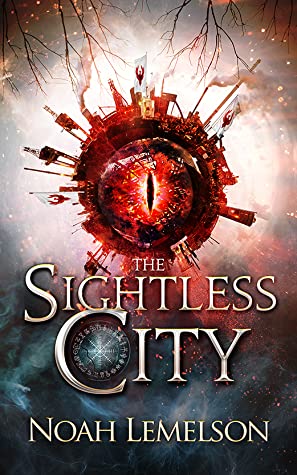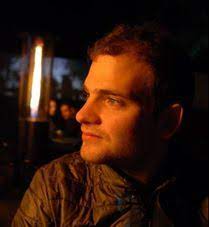 Los Angeles, CA – Noah Lemelson harmoniously merges unique genres in his new steampunk/apocalyptic/fantasy noir novel. “The Sightless City,” (July 20, 2021, Tiny Fox Press) is the debut novel of an upcoming trilogy, and has already received a First Place Award in the 2019 OZMA Book Awards for Fantasy Fiction. Lemelson places realistic and flawed characters in a world both strange and familiar. Strange in its unique creatures, machines, and magics, familiar in the corruption and cruelty that comes with industry and war.
Los Angeles, CA – Noah Lemelson harmoniously merges unique genres in his new steampunk/apocalyptic/fantasy noir novel. “The Sightless City,” (July 20, 2021, Tiny Fox Press) is the debut novel of an upcoming trilogy, and has already received a First Place Award in the 2019 OZMA Book Awards for Fantasy Fiction. Lemelson places realistic and flawed characters in a world both strange and familiar. Strange in its unique creatures, machines, and magics, familiar in the corruption and cruelty that comes with industry and war.
Kidnapping. Enslavement. Murder. Those are only the tip of the iceberg when it comes to actions some will take to protect their interests in æther-oil, the coveted substance that fuels the war-torn city of Huile.
As both veteran and private investigator, Marcel Talwar knows this firsthand, and he likes to think he’d never participate in such things. However, that naïve idea comes to a crashing end when he takes on a new case that quickly shatters his world view. A trail of evidence points to someone in Marcel’s inner circle who’s using him as a pawn to conduct grisly experiments—experiments that could lead to genocide.
Now, Marcel is more determined than ever to discover who’s pulling the strings to this sinister plot. But the further he gets, the larger the target on his back becomes, and it’s not long before Marcel has to ask himself how much and how many he’s willing to sacrifice to get to the truth.
“The Sightless City”
Noah Lemelson | July 20, 2021 | Tiny Fox Press | Steampunk/Dieselpunk Fantasy
Hardcover | 978-1-946501-33-2 | $28.95
Paperback | 978-1-946501-33-2 | $16.95
Ebook | 978-1-946501-33-2 | $8.99
“Stellar worldbuilding and quick pacing. This is sure to entertain any fan of gritty speculative fiction.” – Publishers Weekly
 Noah Lemelson is a short story writer and novelist who lives in LA with his wife and cat. Lover of Science Fiction, Fantasy, New Weird, and Punk. He received his BA in Biology from the University of Chicago in 2014 and received his MFA in Creative Writing from the California Institute of the Arts in 2020. He has had several of his short stories published in both print and online magazines, such as Allegory, Space Squid and the Outsider’s Within Horror Anthology.
Noah Lemelson is a short story writer and novelist who lives in LA with his wife and cat. Lover of Science Fiction, Fantasy, New Weird, and Punk. He received his BA in Biology from the University of Chicago in 2014 and received his MFA in Creative Writing from the California Institute of the Arts in 2020. He has had several of his short stories published in both print and online magazines, such as Allegory, Space Squid and the Outsider’s Within Horror Anthology.
Follow Noah Lemelson on social media:
Facebook: @Noah Lemelson | Instagram: @EruditeGoblin
In an interview, Noah Lemelson can discuss:
- How one’s own flaws allows for deception and control
- The nature of evil, ideological evil vs. pure selfishness
- His unique approach to fantasy with realistic and flawed characters
- How and why he merged the genres he chose
- What’s to come in the world of Huile for the last two installments of his trilogy
An Interview with Noah Lemelson
1. How can fiction alter one’s own self narrative?
I think fiction allows us to look at the world through someone else’s eyes, and that’s a skill that can be turned inward. Different perspectives let us realize that the way we think about anything, including ourselves, is just one possibility, not the be-all-end-all truth. We all live in our own stories, partially written by us, partially written by others, while we can’t always control the way we fit into other peoples’ narratives, I think we do have some control on how we tell our own story. Fiction lets us practice that skill.
2. How did you decide to set your story in a steampunk fantasy world against the tumultuous backdrop of a partial apocalypse?
For whatever reason, I find industrial decay to be utterly fascinating, and even beautiful in its own way. I think that’s one reason why places like Chernobyl are so fascinating, places marked by civilization but no longer controlled by it. Traditional fantasy loves its ruined temples and forgotten cities, I think it’s interesting to take those same tropes and bump them up a couple centuries.
3. Could you explain your “realistic” approach to writing magical characters?
Though the term magic is never used in the book (besides once in a derisive aside), several characters have abilities or powers that are… basically magic with a fancy name. It’s a fun fantasy to imagine problems that magic could solve, but I think it’s often more interesting to look at what magic can’t solve. Self-doubt, moral quandaries, societal inequalities, relationship difficulties, magic has its limit. Its like anything else, skills or powers in one part of life don’t necessarily translate to others, and I think many of the most interesting stories about magic characters, be they literal wizards, super-heroes, or realty-defying inventors, is to look at where their magic is no longer enough.
4. What exactly is the Calamity, and how did that event influence the ongoing wars and discrimination throughout the book?
The details of the Calamity aren’t discussed much in the book, but in short it was a massive disaster caused by the misuse of ætheric weaponry that turned a big chunk of the continent into desolate Wastes. It’s one of those events that is so big that it paradoxically just kind of blends into the background. For most people it’s just a fact of history, an explanation for a reality that is their mundanity. Yet, like most facts of history, it can be trotted out to win political debate, or to excuse terrible acts. The Calamity is always someone else’s fault, an everlasting causa belli, a parable to support whatever argument is currently being made.
5. What inspired you to create this world?
Honestly I always loved the expanded universes for other novels, games, movies, and a not small part of my motivation came from a desire to have a world of my own, where my imagination wasn’t bound by what other people already wrote. As for why it became what it became, that’s a harder question to answer. I’ll say this, it started with the Wastes, and worked its way out.

A former award-winning journalist with national exposure, Marissa now oversees the day-to-day operation of the Books Forward author branding and book marketing firm, along with our indie publishing support sister company Books Fluent.
Born and bred in Louisiana, currently living in New Orleans, she has lived and developed a strong base for our company and authors in Chicago and Nashville. Her journalism work has appeared in USA Today, National Geographic and other major publications. She is now interviewed by media on best practices for book marketing.

